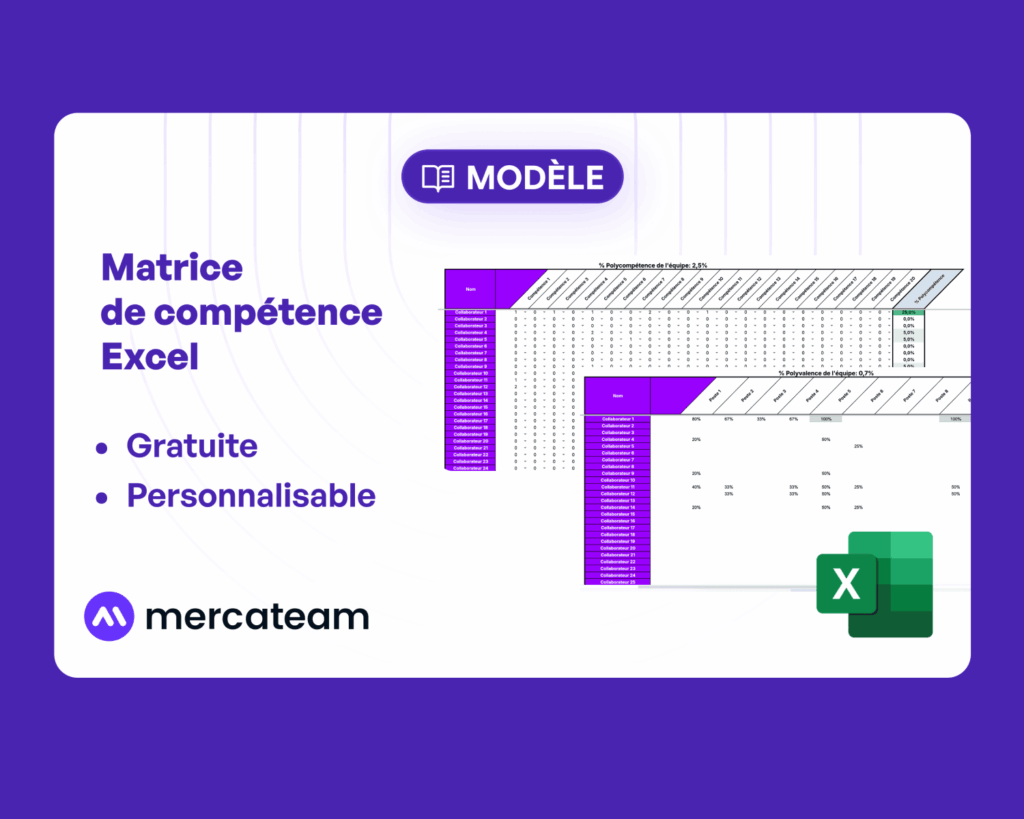According to Caisse des DépôtsThe number of skills assessments carried out under the CPF has risen sharply. From 33,000 in 2019, this number has risen to 85,000 in 2021, and should reach 100,000 in 2022. These data testify to a growing interest in this tool, enabling individuals to better understand their skills, aspirations and potential, and make informed decisions about their professional future.
Key steps to an effective skills assessment
A skills assessment is an invaluable tool for employees wishing to gain a better understanding of their skills and professional interests. Here are the different stages of a skills assessment and how to make the most of them for the employee.
Preliminary phase
During this first stage, the manager and the human resources team meet with the employee to present the skills assessment process, the objectives and the expectations of each party. The HR team takes care to listen to the employee's needs, expectations, motivations and concerns. The aim of this stage is to clarify the issues at stake in the skills assessment, and to ensure that both parties are in phase on the objectives to be achieved. It also enables the employee to ask questions and clarify certain aspects of the skills assessment.
Investigation phase
HR Team assesses skillsand the employee's interests and motivations. This stage can take place over several interview sessions, during which the HR team asks questions to gain a better understanding of the employee's profile. Questionnaires and tests can be used to assess the employee's skills, aptitudes and motivations.
Practical exercises can also be proposed to help the employee gain a better understanding of his or her skills and professional interests. These exercises can include work simulations or work situations.
Conclusion phase
The concluding phase of the skills assessment aims to summarize the results of the investigation phase and draw up an action plan. The HR team assists the employee in identifying training opportunities, avenues for retraining and strategies for optimizing his or her professional situation.
The HR team can also support employees in drawing up a short-, medium- or long-term career plan, taking into account their skills, motivations and professional goals. This action plan can include recommendations for training, certification and coaching, as well as suggestions for reinforcing existing skills or acquiring new ones.
In short, each stage of the skills assessment is crucial to achieving the employee's objectives. The preliminary phase helps clarify the issues and determine the employee's expectations, the investigation phase.
The benefits of skills assessment
Skills assessment is an effective tool for both employers and employees. Here are just some of the benefits for both parties.
For employers
Identifying existing skills :
Skills assessments enable employers to identify the skills and talents of their employees, making it easier to take decisions on recruitment, training and promotion.
Optimizing human resources :
With a skills assessment, employers can better understand their employees' aspirations and motivations, enabling them to adapt positions and responsibilities accordingly. This can lead to better use of human resources and greater job satisfaction.
Preventing turnover :
By identifying the skills and aspirations of their employees, employers can put in place appropriate development plans, reducing the risk of resignation or turnover.
Performance improvement :
By understanding their employees' strengths and weaknesses, employers can implement actions to improve their skills, which can lead to better performance and greater productivity.
For employees
Self-knowledge :
A skills assessment enables employees to gain a better understanding of their skills, aspirations and potential. It gives them a clear vision of their strengths and areas for improvement.
Professional development :
With a skills assessment, employees can identify training and development opportunities that match their needs and career aspirations.
Career development :
A skills assessment can help employees plan their careers and make informed decisions about promotion or retraining opportunities.
Job satisfaction :
By understanding their skills and aspirations, employees can work on projects that match their interests and motivations, which can lead to greater job satisfaction.
Skills assessment: the essential tool for successful career transition
Have you ever found yourself considering a career change? It's true that making a career change can be a big step to take, but it can also be a very rewarding and enriching decision. However, to make a successful career change, it's important to take the time to take stock of your skills, motivations and career aspirations. And this is precisely where a skills assessment can be an indispensable tool.
Have you ever heard of a skills assessment? If so, you're probably aware that it's a personalized process that enables you to take stock of your skills, strengths and weaknesses. But did you know that a skills assessment can also help you clarify your career plans and find the training courses and careers that match your aspirations?
It may sound simple, but it's often difficult to project yourself into a new career without a clear vision of your transferable skills. A skills assessment enables you to take a step back from your current professional situation, and identify your skills, talents and untapped potential. In short, it gives you a global vision of your professional profile.
As part of a career transition, a skills assessment can be invaluable in helping you to identify the skills you need to retrain, and to find the training courses and careers that match your aspirations. But that's not all! A skills assessment can also be an effective tool for reassuring potential employers about the skills and motivations of the person undergoing retraining. It helps to highlight transferable skills and convince recruiters of the relevance of retraining.
Conditions and financing of a skills assessment
Conditions for carrying out a skills assessment
There are several ways of carrying out a skills assessment. It can be carried out during or outside working hours. For employees on permanent or fixed-term contracts, it is possible to obtain leave to carry out a skills assessment. However, entitlement to this leave depends on seniority criteria, which can be consulted on the Ministry of Labor website. People over 45 or with more than 20 years' professional experience can also benefit from their right to carry out a skills assessment.
How can we finance it?
It's important to know that funding for a skills assessment can be provided by a number of different bodies, depending on your situation. If you are an employee, your company may provide funding via the training plan or the personal training account (CPF). If this is the case, note that the initiative comes from your company, but you can refuse if you wish. Employees of the civil service can apply directly to their administration for funding.
If you can't benefit from this funding, there are other options. Employees can apply for funding from the FongécifIn addition, the French Ministry of the Economy, Finance and Industry may cover all or part of the cost of the skills assessment, up to a maximum of 24 hours of invoiced services. Jobseekers can also benefit from Pôle emploi funding, under certain conditions.
Don't hesitate to contact these different organizations to find the financing that best suits your situation.
Tips for a successful skills assessment
Preparation:
Before starting a skills assessment, it's essential to think carefully about your expectations, your professional goals and your motivations. This will enable you to approach the process with a clear vision of what you want to achieve, and guide discussions with the consultant. Take the time to note down your achievements, skills, interests and areas in which you'd like to develop.
Choice of service provider :
Choosing a quality service provider is crucial to the success of your skills assessment. Make sure you select a provider with a good reputation, solid references and experience in your industry. Don't hesitate to ask your professional network for recommendations, consult online reviews and compare offers from different providers before making your choice.
Involvement :
A successful skills assessment requires a personal investment on your part. Be prepared to commit yourself fully to the process by being open and honest with the consultant, and by taking an active part in the discussions, exercises and tests proposed. The more involved you are, the more relevant conclusions you'll be able to draw from your skills assessment.
Communication :
Communication is a key element in the success of a skills assessment. Don't hesitate to openly express your thoughts, concerns and expectations to the consultant throughout the process. Transparent communication will enable the consultant to better understand your needs and propose solutions adapted to your situation. What's more, don't hesitate to ask for clarification if you don't understand certain aspects of the assessment, or if you need additional information.
Follow-up:
Once the skills assessment is complete, it's important to implement the recommendations and action plan developed during the process. Follow the steps and objectives defined, and don't hesitate to ask your consultant, manager or human resources team for help in implementing your professional development plan.
The success of a skills assessment depends largely on your preparation, your choice of service provider, your involvement in the process, your communication with the consultant and your follow-up of the recommendations and action plan. By following these tips, you can make the most of your skills assessment and propel yourself towards a fulfilling and successful career.
Conclusion
Skills assessments are essential for employees' professional development. It enables them to identify their strengths, weaknesses and objectives, so that they can plan an appropriate career path. Mercateam, by creating a skills repository for companies, facilitates this process and contributes to the success of the assessment within the organization.




